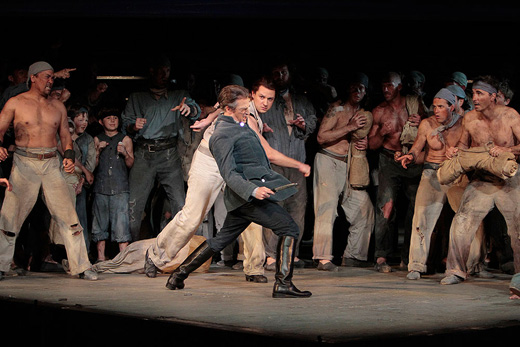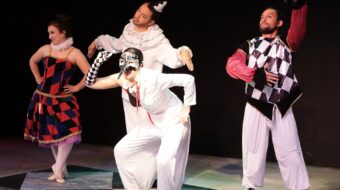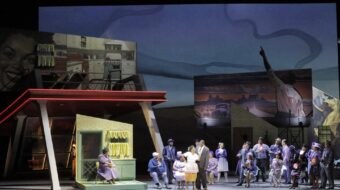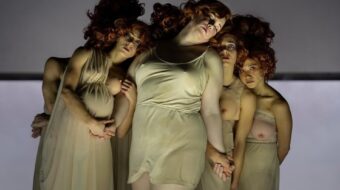
When the American writer Herman Melville died in 1891, he was all but forgotten. After his first novel Typee, published in 1846, became an instant bestseller, the young New Yorker who had called a whaling ship his Harvard skyrocketed to literary acclaim. But just a few years later, after he published the metaphorical Moby Dick, Melville lost his audience and spent the rest of his life in relative obscurity, working as a Manhattan customs inspector. But he continued to write. In 1888 the undaunted scribbler began the philosophical novella Billy Budd. Perhaps one could say that composer Benjamin Britten and his librettists E.M. Forster and Eric Crozier “completed” it with their adaptation.
Los Angeles Opera’s production of Billy Budd is among the grimmest, most dramatic works ever seen on the Dorothy Chandler Pavilion stage. The beatific title character has been press-ganged to serve aboard the British warship the H.M.S. Indomitable in the year 1797, when England and revolutionary France clashed. Unlike his other comrades who chafe at being coerced to go to sea, Billy Budd (the stellar six-foot-four baritone Liam Bonner) is pleased to serve king and country, perhaps because the former foundling finds his place among the 700-man crew. With his beauty, agility, and enthusiasm, Billy quickly rises in popularity and rides the sails as a foretopman.
Billy’s beauty, however, is marred by a speech defect, which leads him to stutter. Both prove to be his undoing, as the cruel Claggart, the Indomitable’s master-at-arms, menacingly portrayed by bass-baritone Greer Grimsley, conspires to crush Billy. Claggart charges Billy with high crimes, setting innocence on a collision course with wickedness. Struck dumb by the unfounded allegations, Billy strikes out. This places Captain Vere (tenor Richard Croft), a decent man who is an eyewitness to the act, between the proverbial rock and a hard place, as he must choose between hewing closely to Britain’s Articles of War or a more humane response.
Why does Claggart set out to destroy the sublime Billy? Billy must be obliterated because his presence ignites Claggart’s libidinous impulses. By eliminating the cause of his yearning, the master-at-arms “conquers” his homoeroticism and thusly proves he isn’t one of “them.” (Winston Churchill, who’d served at the Admiralty, reputedly quipped that “buggery” was an old British naval tradition.)
In addition to the subject of sexuality, Britten and his librettists injected a slew of anti-“Frenchy” slurs as an important political angle into the opera, which is set against the tempestuous tide of the French Revolution. Billy has the misfortune of having previously sailed aboard a ship named the Rights O’ Man; when he naively repeats these words his superiors fear that the foretopman is stirring up a mutiny by proclaiming the ideology of the French revolutionaries. Of course, that revolution’s great champion, Tom Paine, wrote the radical manifesto called The Rights of Man, so amidst the paranoia the misunderstood, apolitical Billy, despite his steadfast loyalty to His Majesty, is doomed.
During his drumhead court martial Billy is interrogated about his political views, and his inquisitors almost ask him: “Are you now, or have you ever been, a member of the Jacobins?” – Robespierre’s radical party. Britten’s opera was first produced in 1951, during the height of the Red Scare: The composer and his librettists were quite possibly making a clever reference to the anti-communist hysteria of the era.
LA Opera’s well-acted production, as directed by Julia Pevzner, with an all-male cast of about 75 performers, ends with a tip of the hat toward the mass revolts sweeping the world. While Act I sets up the plot and provides necessary exposition, the second act is a theatrical tour-de-force, with a near nautical battle as the Indomitable swoops down on a French frigate and more. Billy Budd’s seafaring set, hydraulics and all, is nothing less than stunning. The imaginative, jaw-dropping stagecraft is magnificent to behold.
Britten’s music is often appropriately portentous, but some sea shanties help lighten the mood. Grant Gershon is the chorus master. According to James Conlon, Billy Budd – which requires 200 people to present and stage – is the 100th opera his wand has commanded – an appropriate number for Britten’s centennial.
Billy Budd is performed Sundays March 2 and 16 at 2:00 pm and March 5, 8, and 13 at 7:30 pm by LA Opera at the Dorothy Chandler Pavilion, 135 N. Grand Ave. For more info: (213)972-8001; www.laopera.com.












Comments